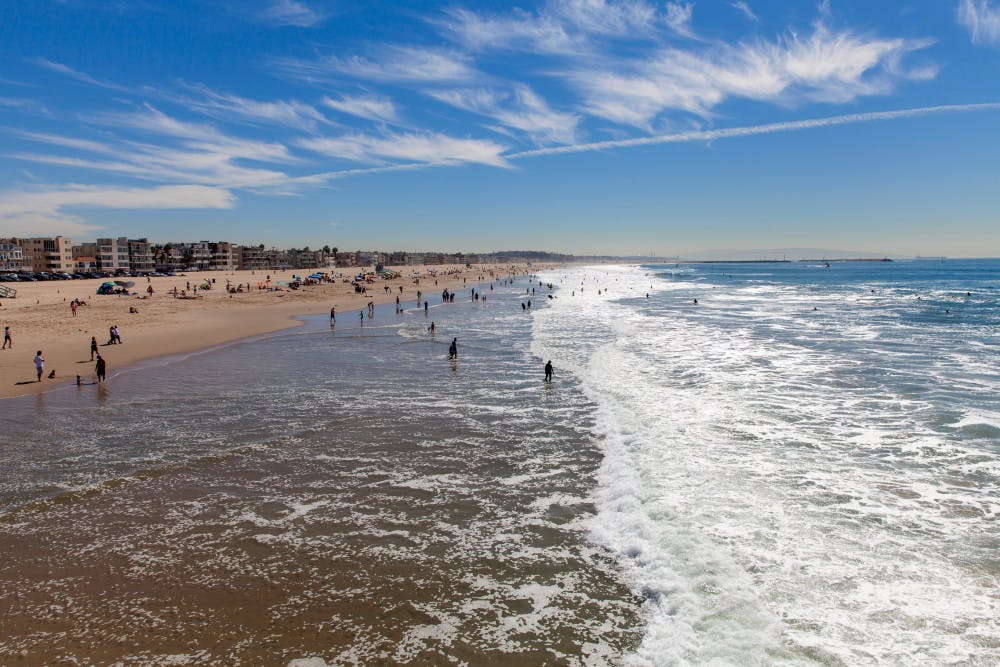By Ariel Steinsaltz
Staff Writer
During the current spring break season, many people have traveled on airplanes despite the ongoing coronavirus pandemic, according to USA Today. Last Sunday marked 11 consecutive days of the Transportation Security Administration screening more than one million travelers, and was its busiest day since the pandemic was declared a national emergency on March 13, 2020. Many more people are traveling by air than a year ago, but the numbers have not yet reached pre-pandemic levels.

decreasing Covid-19 regulations during spring break season (Envato Elements).
Though vaccines are rolling out across the country, CDC guidelines still advise against nonessential travel, even for people who have received a coronavirus vaccine. Many people went against these guidelines over Thanksgiving and the winter holidays, and even more appear to be doing so during this spring break season, according to USA Today.
Florida, particularly Miami Beach, is struggling with crowds caused by visiting spring breakers, and had to declare a state of emergency on Saturday, according to USA Today.
Florida Gov. Ron DeSantis welcomed spring breakers to the state, and stressed the state’s lack of strict coronavirus restrictions. He recently removed fines for violating safety precautions and reduced restrictions on bars and restaurants, making Florida one of the least-restricted states. This left Floridian cities struggling to deal with all the spring breakers.
Miami Beach City Commissioner David Richardson said, “DeSantis rolled out the red carpet for visitors, and he left us to deal with the aftermath. People call it spring break and I correct them — this is a high impact period,” according to Politico.
Spring breakers are also traveling en masse to Hawaii, and many are violating the state’s mask mandate. Saturday saw the highest number of travelers to Hawaii in a single day since the start of the pandemic. With the state’s economy largely dependent on tourism, measures were put in place in October to make it easier for people to travel there. But numbers still remained relatively low until the start of spring break season, and now there is a large spike in visitor numbers, according to USA Today.
Many visitors say there are different rules about mask wearing in their home states, and they feel they do not need them while visiting Hawaii. One visitor from Wisconsin said, “We carry our masks around and if we walk into an establishment we’ll wear one, and if people look like they’re uncomfortable with us around, we’ll put one on. But otherwise, like I said where we come from, people are really not required to wear them,” according to USA Today.
States around the country have started to lift restrictions, including mask mandates. Texas lifted its mandate early this month, which has caused conflict between business owners who still want to require masks in their establishments and customers who are against having to wear them. Owners have reported receiving death threats over requiring masks and having their employees threatened.
One restaurant owner in San Antonio said the governor was responsible, having been the one to lift the mask mandate. The owner said, "If something happens, the blood's on his hands," according to CNN. Regardless, more states are planning to lift mask mandates in the near future, including Colorado and Indiana.
This increase in travel and easing of restrictions comes as the CDC has issued new guidelines for the growing number of people who have been fully vaccinated against Covid-19. They have said it is safe for fully vaccinated people to visit unvaccinated people in their homes without masks or social distancing, provided those unvaccinated people are at low risk for severe coronavirus complications. However, if anybody is at high risk for severe illness, or if people from more than one unvaccinated household are present, mask wearing and social distancing should still be observed, according to CNN.
The CDC also stressed that even those who are fully vaccinated should avoid crowds and large gatherings, such as going to church. They also said it was important to still be very cautious while traveling, and that people should quarantine before and after traveling. No vaccine is 100% effective, and there is still a chance that people who have been vaccinated can spread the virus to others, according to CNN.







